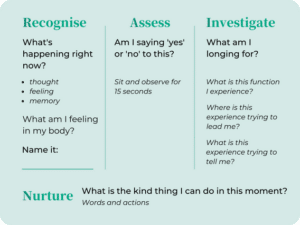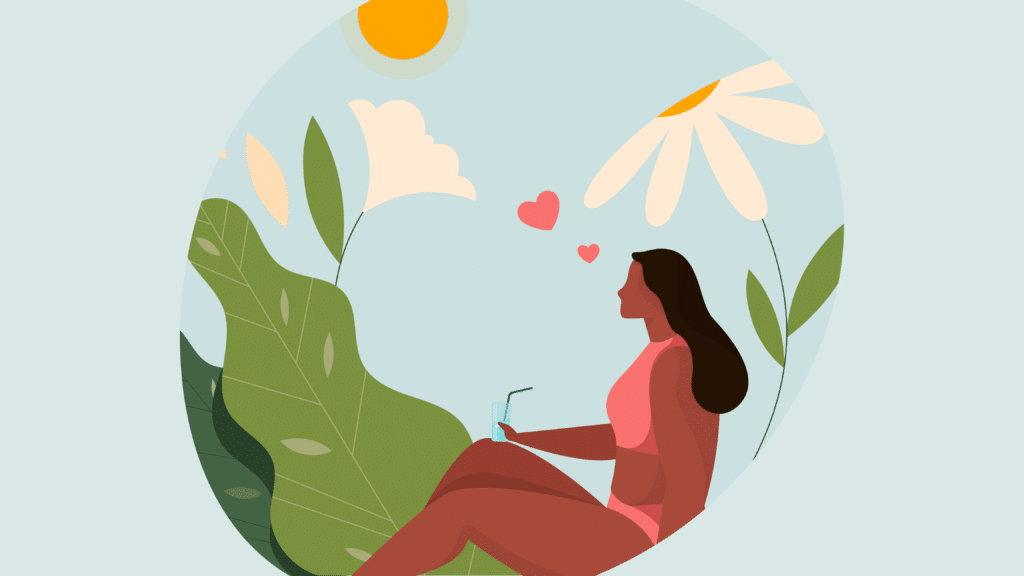Do you ever feel overwhelmed by the demands of life? Just as you tick one task off your to-do list, another one crops up.
Ironically, the busiest moments in life are also the moments where we need to focus on slowing down so we don’t burnout. Embracing slow living may be the antidote to help you recalibrate and focus on the things that matter most to you in life.
Slowing down and realigning your life with your values is also an essential component of mental well-being. This will look different for everyone; there is no ‘’one-size-fits-all’’ when it comes to self-care. With this in mind, let’s explore the slow living movement, and examine some practical self-care tips for summer.
What is slow living?
Slow living is a mindset whereby you curate a more mindful lifestyle that’s aligned with your values and take time for self-care. Despite some connotations, slow living doesn’t mean dropping all of your responsibilities and relaxing all day. Instead, it focuses on doing things at the right speed. The slow living movement focuses on quality over quantity. Instead of rushing through life on autopilot, it encourages you to slow down and take time to incorporate self-care into your life.
Slow living also rejects the idea that to be successful, you need to constantly be busy. Yes, productivity is important, but it’s equally important to take a step back and make space for reflection and relaxation. When you take time to do so, you’ll also create the opportunity to focus on prioritising your mental well-being.
Slow living means living better, not faster.
How did the slow living movement begin?
Although slow living may seem like a new movement, its inception began in 1980s Italy, when a group of activists formed Slow Food, a movement that defends regional food traditions. Today, the slow food movement continues to protect gastronomic traditions, advocates fair pay for producers, encourages enjoyment of good quality food, and promotes activities around slow living and sustainability.
In 2004, author and speaker Carl Honoré helped bring the concept of slow living into the mainstream with his book ‘In Praise of Slowness’. Honoré explored how Slow Food sparked a broader slow living movement with ‘slow’ now being applied to other aspects of life such as work and leisure.
From here, interest in the slow living movement peaked significantly in 2020. The stress of the covid-19 pandemic caused many people to reassess their lifestyles and focus on what really matters to them. In fact, Google reported a 4x increase in the number of YouTube videos titled ‘slow living’ in 2020 compared to 2019. While many of these videos depict an idyllic lifestyle which is far from the reality of most, the increased interest in this type of content illustrates a desire to reconnect with meaningful hobbies, nature and ourselves.
Embracing slow living and self-care for the summer
Self-care is often portrayed as ‘do this one thing and never feel stressed again.’ Ironically, this may lead to self-care becoming another box to tick off our to-do-list, stressing us out even more.
If you approach slow living and self-care with the intention of not feeling stressed, you may find yourself disappointed.
Instead, focus on intention: try slow living when you want to live more mindfully. Take the time to think about what you value; as a part of who you are or want to be, rather than something you ‘’must do’’ to get rid of anxiety or negative thought patterns.
With this in mind, let’s look at a gentler approach to slow living and self-care for summer. The busyness of the summer months means it may be the right time to embrace slower living and find the best self-care tips to help you live a balanced life.
In order for us to properly take care of ourselves we need to understand what we need first.
But how do you know what you need at this moment? We advise you to try the RAIN method (Recognise, Assess, Investigate, and Nurture) to help you decide what your body and mind is trying to tell you.

- Recognise what you need: In this step, tune into the present moment and think about what you need.
- Assess your emotions: Next, you can simply observe your emotions and ask yourself if you are comfortable to say yes or no.
- Investigate how you feel: Look at the feeling that is coming up for you; what is it telling you, where is it trying to lead you?
- Nurture your emotions: Think about the most nurturing thing you can do for yourself in the present moment.
Before choosing the best self-care activity for you, assess whether your motivation is intrinsic or extrinsic. Intrinsic motivation comes from within yourself, and often requires no more reward other than performing the act itself. Extrinsic motivation comes from somewhere outside of the act itself. Although we need both forms of motivation in our lives, self-care needs to come from within. Extrinsic motivation often looks like ‘’I have to do this, for someone else,’’ ‘’I need to do this, or else something bad will happen.’’ Instead, when it comes to self-care, focus on intrinsic motivation – ‘’I want to do this, because I find it fun and engaging.’’
Now that we’ve looked at some preliminary steps to take before engaging in slow living and self-care, let’s browse some tips below.
Remember, your self-care practice might look entirely different to the suggestions below, and that’s completely normal!
Finding the best way of slowing down is all about what works for you.
Take some time to treat yourself, whatever this means for you:
Social media often depicts self-care as treating yourself to a massage, enjoying a spa day, eating at a fancy restaurant, or buying yourself flowers. However, these activities can be expensive and may not be accessible to everyone. Rather than looking at external influences, think about how you like to treat yourself. Perhaps this is a simpler activity such as going for a walk or catching up with a friend over a coffee.
Try to maintain a healthy lifestyle:
Maintaining a healthy lifestyle and self-care go hand-in-hand. This is because habits such as good nutrition, adequate sleep, and consistent exercise help us to live happier and healthier lives. A healthy lifestyle can also help us during our busiest periods. Have a full schedule ahead of you at work? Try a walk or some yoga stretches in the morning and see how your concentration and productivity skyrockets.
Do nothing:
The Italian phrase ‘Dolce far Niente‘ translates to ‘the sweetness of doing nothing.’ Simply doing nothing may seem like a luxury afforded to the lucky few, but with the right practice, we can cultivate some moments of simply being into our lives. Carve some time out of your day to just ‘’be’’ in the present moment, even if you just have a couple of minutes to spare.
Take time to appreciate the little things in life:
How often do we find ourselves wishing for the next thing – the next promotion, salary raise, vacation, or new material possession? When we take some time to embrace slow living, we can take a step back from over-consumption, and appreciate what we have in the present moment. Appreciating the little things might look like enjoying a walk, a home cooked meal, or watching a sunset with a loved one.
Embrace mindfulness:
Mindfulness, a technique you can learn which involves noticing what’s happening in the present moment, is key to slow living. It involves living in the present moment, with the goal of letting go of worries about the future or dwelling on the past. Carving a few moments out of your day to practise mindfulness can help you live a slower, happier life. Ready to embrace mindfulness? Try our 15 minute Mindfulness Meditation to clear your mind.
Take a break from technology:
Although completely disconnecting from technology isn’t possible for most people, there are still effective ways to reduce your tech consumption. By taking regular breaks throughout the day and disconnecting from technology, you can reduce stress and increase overall mental well-being. Want to take a break? Try our Short Guided Mindful Break from Screens.
Spend more time in nature:
Whether you have time for a quick stroll through your park or want to spend the day hiking, exposure to nature can help you live a slower, healthier life. According to the American Psychological Association, time spent in nature is linked to improved attention, lower stress, better mood, and even upticks in empathy and cooperation.
No matter how busy the summer season is, taking some time to slow down and focus on self-care will help you cope with life’s many demands. Although many self-care trends exist in today’s world, finding the best ones for you is deeply personal. Whichever self-care tips you choose, I hope they will help you improve your mental well-being and cope with life’s stressors more effectively.
Want to live more in the present moment?
👉 Try one of our mindfulness group sessions via Spaces to OpenUp.





